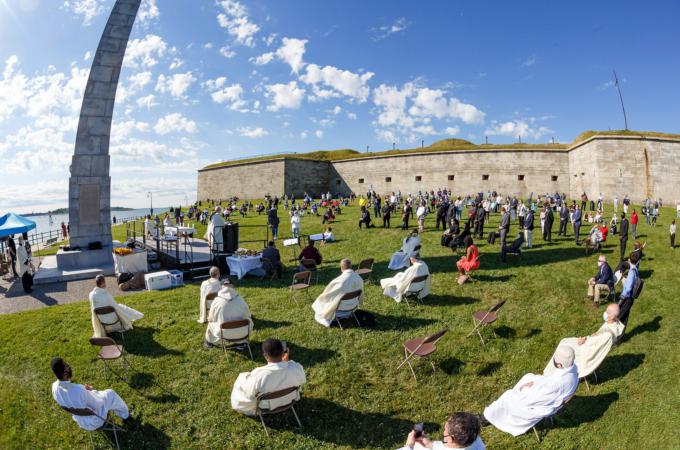Cardinal celebrates Mass for racial justice and healing
SOUTH BOSTON -- Dozens of people, including local officials and African American faith community leaders, came to Castle Island on June 13 to attend an outdoor Mass celebrated by Cardinal Seán P. O'Malley for racial justice and healing.
The event was organized by Congressman Steven Lynch, Father Robert Casey, and the parishes of South Boston. It took place in light of the May 25 death of George Floyd, an African American man in Minneapolis. Floyd died in police custody after being arrested for allegedly using a counterfeit bill. Video evidence indicates that a police officer knelt on Floyd's neck for almost nine minutes, even as he said he could not breathe.
Floyd's death sparked weeks of protests against racism and police brutality across the United States. In some cities, including Boston on May 31, protests culminated in looting and violent clashes between police and civilians.
One parishioner of the South Boston Collaborative said she attended the Mass on June 13 because she did not want to be "on the sidelines" and wanted to "let people know that they're not alone, that somebody's with them."
Speaking to The Pilot after the event, she said she did not feel comfortable attending larger protests during the COVID-19 pandemic, so the outdoor Mass "felt like the right balance," as attendees wore masks and spread out across the grass to maintain social distancing.
Nearly a dozen priests from the city of Boston concelebrated the Mass, and several African American ecumenical and interfaith clergy attended.
Bishop William Dickerson of the Greater Love Tabernacle Church addressed the assembly before the Mass began, talking about many of the events of the previous weeks as well as those further back in Boston's history.
Dickerson said that he and many others were pleased to see people of different races and backgrounds unite for peaceful protests.
"We support those who, in good faith, protest peacefully in regards to justice, but we oppose the looting and destructive behaviors which are antithetical to the cause. Police should not be attacked. Protesters should not be harmed," he said, receiving applause.
He recalled the "profound resilience and unity" displayed after the Boston Marathon bombings in 2013.
"We should not turn on each other, whether we're police officers or protesters, whether we're ministers or laypersons. 'Boston strong' must not be a cliche, it must be a daily reality wherein we embrace everyone, including blacks," he said.
Dickerson encouraged listening to members of the African diaspora, standing against racism of all kinds, even among close friends or family, and supporting justice on all levels, "because justice will help to produce healing and peace."
He asked his audience to join in challenging the business community "not to post 'Black Lives Matter' but hire qualified blacks in meaningful positions."
"We do not want symbols without substance. We can take down statues of slave owners, we can remove the names of racists from public squares, but if the hearts of people are not changed, and there's no legislation brought into the equation, then it is but a vain effort," Dickerson said.
He said that for Christians, "Jesus was our example of embracing all people. And if we talk about Jesus, let's not just talk about him, let's do what he did."
During the Mass, city councilor Lydia Edwards served as the lector, and former state senator Linda Dorcena-Forry led the prayers of the faithful.
In his homily, Cardinal O'Malley spoke at length about the parable of the Good Samaritan. He said he liked to imagine the impact that the story had on Jesus' original audience.
"In those days, the words 'good' and 'Samaritan' did not appear in the same sentence," the cardinal said.
He pointed out that the Samaritan took a risk by approaching the wounded Jew because people might have suspected the Samaritan of having carried out the attack and robbery himself.
"I am sure that the Samaritan knew what discrimination was. He would have suffered the sting of humiliation, suspicion and rejection whenever he ventured outside of his own community," Cardinal O'Malley said.
Alluding to some of Jesus' other teachings, the cardinal said that the Samaritan was "a man who went the extra mile." Rather than alerting someone else of the wounded man's needs, he personally took care of the man, transported him to safety, paid for his care, and promised to "follow up."
"Like the Samaritan, we have to understand that there is no quick fix for the harm that has been done. We need to return again and again to face the situation, to nurture change and recovery. It will not happen without the sustained effort and focus of all. It is not enough to draw near once for demonstration or a prayer service and then turn our backs and cross over to the other side of the street. The symbolic gesture or compassionate word is not enough. We need concrete reform, transparency and determination to do what needs to be done, to pay the price, to work together and make it happen," Cardinal O'Malley said.
He emphasized that "racial tolerance is not enough," and said the antidote to racism is community and solidarity.
"As we contemplate the figure of the Samaritan whose courage and sacrifice made him neighbor to the man half-dead, the man who could not breathe, lying on the ground, let us heed Jesus' command from today's Gospel: 'Go and do likewise!'" Cardinal O'Malley said.



















